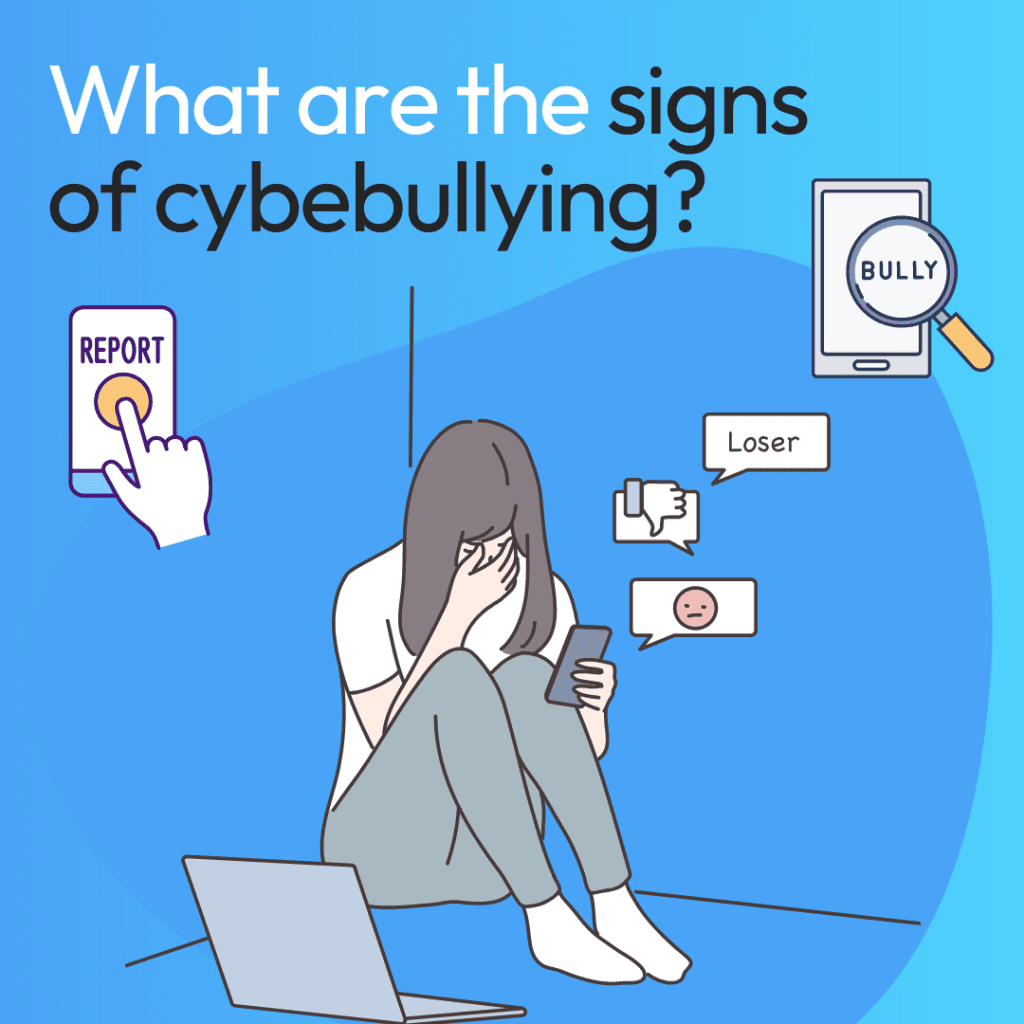As technology continues to play an increasingly significant role in the lives of young people, so does the prevalence of cyberbullying. Cyberbullying refers to the use of electronic communication platforms, such as social media, text messages, or online gaming, to harm, intimidate, or harass others. This form of bullying can have serious consequences on a tween or teen’s mental and emotional well-being, making it crucial for parents to be vigilant about their child’s online activities. In this blog post, we will explore the signs parents of tweens and teens should look out for to determine if their child is experiencing cyberbullying and how to respond appropriately.

What are the signs of cyberbullying?
Emotional Withdrawal
One of the primary indicators of cyberbullying is a sudden emotional withdrawal or change in behavior. If your usually sociable and communicative child becomes more isolated, moody, or avoids discussing their online activities, it may be a cause for concern. They may also exhibit signs of anxiety or depression, such as frequent sadness, irritability, or unexplained outbursts of anger.
Reluctance to Use Electronic Devices
If your child shows a noticeable reluctance to use their electronic devices, including smartphones, laptops, or tablets, it could be a sign that they are experiencing cyberbullying. If your avid gamer who normally plays 8 hours a day, drastically decreases their gaming time out of the blue, it could be cause for concern. Since cyberbullying often occurs online, victims may try to distance themselves from the source of their pain by avoiding electronic devices altogether. Use ProtectMe by Kidas to monitor your child’s gaming time.
Changes in Sleep and Eating Patterns
Cyberbullying can be emotionally overwhelming for tweens and teens, leading to disruptions in their sleep and eating patterns. Look for signs of insomnia, nightmares, fatigue, loss of appetite, or sudden weight changes. If you notice such changes, it’s essential to initiate open and supportive conversations with your child to uncover the possible reasons behind their altered behaviors.
Decline in Academic Performance
A once academically motivated child suddenly performing poorly at school could be facing cyberbullying issues. The emotional toll of online harassment may lead to decreased focus, concentration, and engagement in schoolwork. Teachers and parents should be attentive to any significant changes in academic performance and communicate with the child to offer assistance and support.
Hesitation to Attend School or Social Gatherings
Fear of encountering cyberbullies can lead to a reluctance to attend school or participate in social events. If your child seems anxious or avoids going to school or other places they previously enjoyed, it may indicate that they are experiencing online harassment. Talk to your child about their feelings and offer encouragement to help them overcome their anxieties.
Unexplained Withdrawal from Online Accounts
If your child unexpectedly deletes or changes their social media accounts or gaming accounts or avoids logging in altogether, it could be a sign of cyberbullying. Victims of online harassment may try to escape the negativity by distancing themselves from their virtual identities. However, sudden and unexplained changes in online behavior can also be a warning sign, so it’s important to communicate openly with your child about their online experiences.
Secretive Online Behavior
Children who are victims of cyberbullying may feel embarrassed or ashamed about their experiences, leading them to hide their online activities. If you notice your child becoming overly secretive about their online conversations, password-protecting their devices, or quickly switching screens when you approach, it may indicate they are trying to protect themselves from potential humiliation or harm.
Uncharacteristic Aggression or Bullying Behavior
Sometimes, victims of cyberbullying may internalize their pain and lash out at others in an attempt to regain control. If you notice your child displaying aggressive or bullying behavior, it could be a sign that they are experiencing online harassment themselves.
What to Do if You Suspect Cyberbullying
If you suspect that your child is a victim of cyberbullying, it’s crucial to respond promptly and supportively.
Keep the Lines of Communication Open
Create a safe space for your child to share their feelings and experiences. Let them know that you are there to listen and support them without judgment. Avoid reacting with anger or blame, as this may cause your child to withdraw further.
Document the Evidence
Encourage your child to save any harassing messages, images, or other forms of cyberbullying they encounter. This documentation may be useful later if you need to involve school authorities or law enforcement.
Contact the School
If the cyberbullying involves classmates or occurs during school hours, inform the school administration about the issue. Many schools have policies in place to address cyberbullying and can take appropriate actions to protect your child.
Report to the Platform
If the cyberbullying occurs on social media, gaming platforms or other online platforms, report the incidents to the respective platform’s administrators. Most platforms have mechanisms for reporting bullying and can take action against the perpetrators.
Involve Authorities When Necessary
In severe cases of cyberbullying involving threats, stalking, or other criminal activities, it may be necessary to involve law enforcement. Your child’s safety should always be the top priority.
Seek Professional Support
Consider seeking the help of a counselor, therapist, or mental health professional to assist your child in coping with the emotional impact of cyberbullying. Professional support can be crucial in helping them navigate this challenging experience.
In Conclusion
As the digital landscape continues to evolve, it’s essential for parents to be vigilant about their children’s online experiences. Knowing what the signs of cyberbullying are will help you identify cyberbullying in your child earlier. Cyberbullying can have devastating effects on a tween or teen’s mental health and well-being, making early detection and intervention vital. By being aware of the signs of cyberbullying and responding with empathy and support, parents can create a safe environment for their children to thrive both online and offline. Remember that open communication and understanding are key to helping your child overcome the challenges posed by cyberbullying and emerge stronger and more resilient.